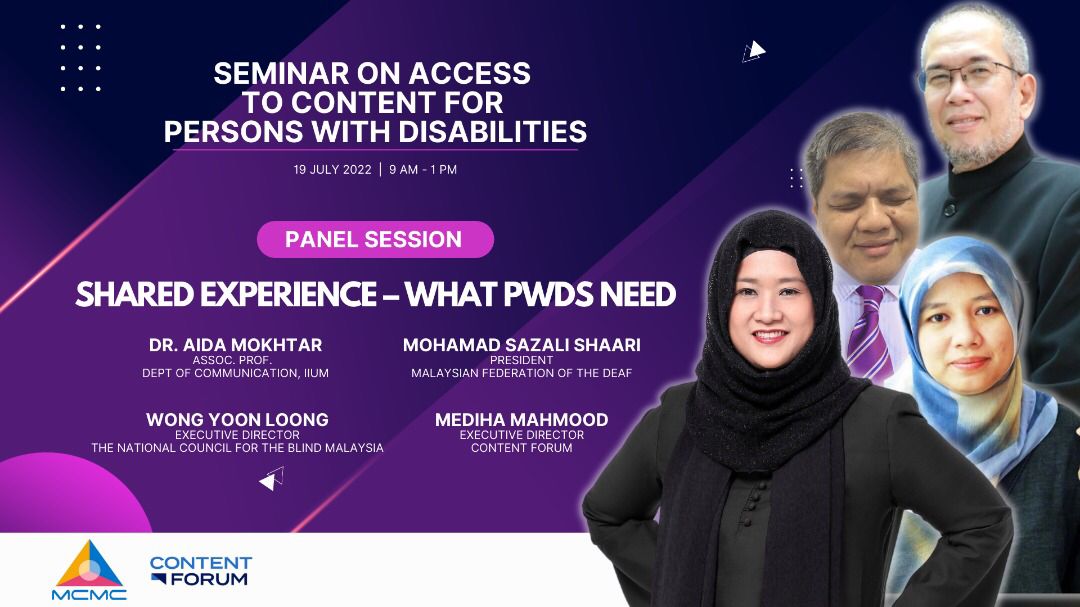By Rafiqi Yusoff
KUALA LUMPUR, 21 July 2022: Media accessibility is needed for persons with disabilities (PwDs) to acquire the same information as people without a disability in an equally integrated manner.
The concern was shared by one of the panelists, Assoc. Prof. Dr. Aida Mokhtar, in a webinar organised jointly by the Malaysian Communications and Multimedia Commission (MCMC) and Multimedia Content Forum of Malaysia (CMCF) entitled ˜Access to Content for Persons with Disabilities held yesterday.
As a lecturer at the Department of Communication, IIUM, Dr. Aida shared that she had encouraged her Professional Speech Communication students to do an assignment on webinars with the theme Care for Disability Inclusion by including captions to make it accessible to all while ensuring that the students empathised with PwDs.
She stated that the IIUM’s website is made accessible to PwDs that enable them to access the information as well as making them included as part of the IIUM community. The features on the IIUM website that support PwDs are: increasing the font size of the website, changing its contrast, and underlining links.
Apart from that, having a son with autism also makes Dr. Aida self-reflective including being patient and accommodating towards PwDs.
œIn my class, I apply the skills that I have gotten from my son with autism. I also simplify complex problems and make sure that persons with disabilities are treated in a dignified manner and are not discriminated against.
She further said that it is our moral obligation as Muslims to treat persons with disabilities ethically and never take advantage of our perfect capabilities by putting down these people.
œWe have been given complete capabilities so we need to use them to understand the position that persons with disabilities are in, Dr. Aida remarked.
Meanwhile, President of Malaysian Federation of the Deaf, Mohamad Sazali Shaari, reckoned that captions help the deaf or hearing impaired community a lot in order for them to access information and media other than depending on sign language interpreters.
However, Sazali also pointed out several concerns including that closed captions are not available in Malay, as the local language. Since most of the captions are in English.
œI hope there will be more localised efforts such as closed captions in Malay for the deaf community since we are not used to Bahasa Indonesia, Sazali said.
According to Sazali, research has proven that captions help in improving language acquisition for deaf people who could slightly hear to improve certain words pronunciation.
œFor deaf people, there are always limitations. Technology could do its part, digitalisation is out there and it helps a lot, Sazali added.
Besides, the Executive Director of the National Council for the Blind Malaysia, Wong Yoon Loong also highlighted some concerns with regards to access to media and information.
He emphasised that audio description is highly beneficial to the blind community, and there is much information on the COVID-19 pandemic that is not displayed in audio description.
Wong highlighted that in order to get information from television, family members and friends will share this with them as the information is not presented in audio description.
Other than that, he also hopes that many companies and productions produce information that come with audio descriptions which are fully accessible to the blind community.
The webinar was moderated by Mediha Mahmood, the Executive Director of Content Forum, which was held live on Tuesday (19 July) around 11.30 A.M. via Zoom Meeting and was attended by more than 150 participants.***
